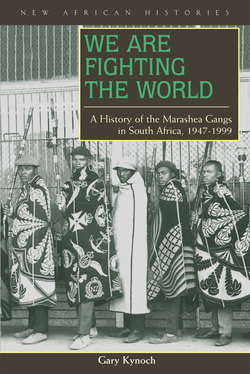Читать книгу We Are Fighting the World - Gary Kynoch - Страница 9
На сайте Литреса книга снята с продажи.
ОглавлениеAcknowledgments
THIS BOOK WOULD NOT have materialized without the efforts of Tsepang Cekwane and Booi Mohapi. Along with conducting and transcribing interviews, Tsepang proved particularly adept at finding Marashea throughout Lesotho and in South African townships and informal settlements. His navigational skills saved me from getting lost more times than I can remember, and his enthusiasm for this project made him a pleasure to work with. We learned much about the Marashea together. Booi, assisted by his wife, Mampolokeng, completed a number of superb interviews. Teke Tseane lent valuable assistance at a time when interviews were hard to come by. Litabe Majoro, who studied the Marashea as a student at the National University of Lesotho, was kind enough to direct me to one of his informants and conduct an interview. The stories told by the men and women who related their lives as Marashea provide the foundation of this study.
Philip Bonner’s work inspired my research and, despite an extraordinarily demanding schedule, Phil generously gave his time, advice, and copies of interview transcripts. David Coplan also offered encouragement. I owe a special debt to Rosemary Burke, the Employment Bureau of Africa’s archivist. Rosemary helped me sift through files and took it upon herself to contact several people in the mining industry on my behalf. Kent McNamara graciously passed along numerous materials and discussed the Russians’ activities on the mines. I would like to express my appreciation to various staff at Harmony Gold Mine who took the time to speak with me. Thanks are due to Puseletso Salae, Raymond de Boiz, and Don Mattera, who all shared their experiences with the Marashea.
The research for this book was conducted while I was a visiting fellow at the University of the Witwatersrand’s now-defunct Institute for Advanced Social Research. I am grateful to Charles van Onselen and the IASR staff for hosting me at Wits. Barb and Herb Anstadt provided a home away from home in Johannesburg and have become our South African family.
At Dalhousie University, Jane Parpart and Phil Zachernuk nurtured the thesis that has eventually become a book. Their support, guidance, and friendship sustained me throughout my tenure as a graduate student. I thank them both.
Jean Allman’s patience in steering the manuscript through to publication is also greatly appreciated. I gratefully acknowledge funding from the Social Sciences and Humanities Research Council of Canada for research in South Africa.
Finally, this book is dedicated, with all my love, to Theresa Ulicki.
